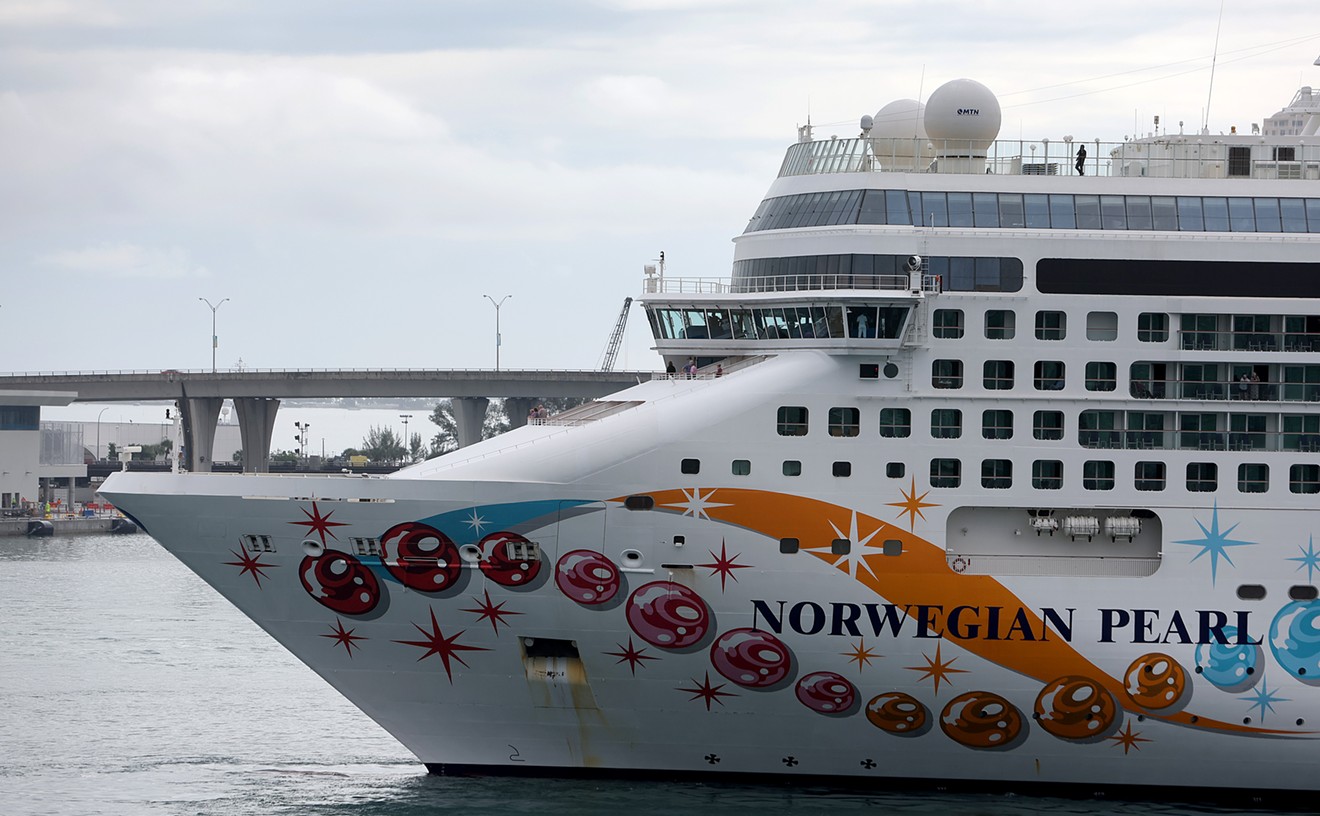The best film model for interracial teams such as Willis-Jackson is probably 1958's The Defiant Ones, with Tony Curtis and Sidney Poitier doing the white guy-black guy two-step as a pair of escaped convicts literally chained together at the ankles. But the Die Hard production team obviously had a different duo in mind during casting: Mel Gibson and Danny Glover. Welcome to the enlightened Nineties! Nowadays when they talk of screen chemistry in Hollywood they're less apt to refer to a boy-girl romantic couple than a macho salt-and-pepper action-hero set.
Samuel L. Jackson certainly has had plenty of practice playing the pepper side of the equation. His Pulp pairing with John Travolta was probably the high-water mark in Jackson's career, the low being his duet with Nicolas Cage in the so-bad-it-was-offensive Amos & Andrew. Jackson also plays the wounded cop who ultimately comes to David Caruso's aid (this time against Nicolas Cage -- they must have had a falling out over who should take the fall for Amos) in the recent film noir, Kiss of Death. Jackson, it seems, feels an affinity for proud, angry black men who eventually align themselves with the white guys who started out antagonizing them. With mixed results, he goes to that well once more in Die Hard With a Vengeance. Not for a minute did I buy Zeus's (apparently Hollywood has exhausted every regular human name and has turned to Greek gods for inspiration) transition from a honky-hating shop owner to Bruce's best buddy in the multiracial sandbox. The metamorphosis is about as credible as Louis Farrakhan converting to Judaism and joining a kibbutz in Israel. Still, Jackson shoulders more than his share of the dramatic burden. His ceaseless needling of Willis provides some of the film's best lines, such as when McClane, referring to his Christmas Eve sojourn to SoCal in the first Die Hard, mentions having been involved in a highly publicized police action in L.A. "Rodney King?" wonders Zeus aloud.
Jackson isn't the only actor re-creating a role he's done before. Jeremy Irons as a mercenary terrorist with a score to settle with McClane essentially offers a human face and body to match the scheming leonine cartoon villain he gave voice to in The Lion King. Irons lacks the charisma Alan Rickman exhibited in the original Die Hard, but his work here outshines most generic action-movie bad guys. And Willis, of course, is the franchise player, the trademark smirk at the center of the Die Hard facade.
This trip around the block finds McClane down on his luck, drinking too much, suspended from the NYPD for unspecified transgressions, and once again separated from his wife, Holly. She's in L.A.; he hasn't spoken to her in more than a year. In Holly's absence, Willis plays McClane as the prototypical broken-down, alcoholic, cynical loner gumshoe. Willis has his moments, but for the most part it's a workmanlike rendering. Which pretty much frees up Samuel L. Jackson to steal yet another movie out from under his better-known white costar. He does that with aplomb despite the filmmakers' insistence on making his initially cold and jagged character go all warm and fuzzy before the final credits roll. It takes a while to get accustomed to the sight of a mugging champ such as Willis deferring to his costar, and graciously letting Jackson have all the best lines.
Without Holly McClane's life hanging in the balance as it did in Die Hard and its sequel -- Willis only talks about her here; she never appears on-screen -- it becomes much harder to buy the premise that a fuckup such as McClane would stick his neck out just because it's the right thing to do. One of the fundamental tenets of action movies holds that the audience's sympathies for a hero relate directly to the degree to which one (or more) of his loved ones is threatened. The first two Die Hards understood this verity and used Holly to great advantage. You knew McClane still loved her; he had no choice but to go after those bad guys. His wife was in that building or on that plane! But now it's a different story. McClane has become a bitter, self-loathing shell of a man with nothing to live for.
The script provides Willis's McClane no succor, and therefore no reason to care about anyone or anything. One of two situations must have occurred here. Either the filmmakers feared audiences wouldn't buy a scenario in which Holly McClane stumbles into mortal jeopardy yet again, thus forcing her estranged husband to rescue her for a third time, or they simply couldn't hammer out a contract with Bonnie Bedelia, the actress who played the disaster-prone Mrs. McClane. In either case, the movie could have used a seriously endangered love interest to up the ante for the listless lawman, and make his heroics more believable for the audience.
Instead we wind up with a pair of heroes, one white and one black, who put their lives on the line because of some internal code that tells them it's the right thing to do. Something is missing. Even the filmmakers sense this. They try to graft on a personal angle -- Simon claims to have booby-trapped the elementary school Zeus's sons (Hephaestus and Ares?) attend. But then they shoot themselves in the foot by revealing that the school bomb might be a harmless decoy, thereby negating any suspense that putting Zeus's kids at risk might have generated.
You have to wonder about an action movie that mutes its own thrills. In one scene Willis and Jackson race through Central Park in a commandeered taxi to get to a pay telephone on the other side of town as quickly as possible. This relatively inconsequential scene goes on and on, the director never tiring of stock shots of unsuspecting pedestrians leaping out of the way as the cab barrels past. You keep expecting something really wild and unpredictable to happen, but nothing does. Finally, mercifully, the segment ends with the car cresting a hill and going airborne as Zeus and McClane let out the obligatory wide-mouthed "Ahhhhhhh!" scream. The sequence inexplicably stretches out a moment in the story that should have lasted a fraction as long. To make matters worse, the cab wasn't even being pursued. What fun is a chase scene without a chaser? The whole episode falls flat and pointless.
Speaking of flat and pointless, what were the filmmakers thinking when they decided on the obtrusive "Battle Hymn of the Republic" musical motif to score a montage of Simon's minions literally breaking the bank on Wall Street? And still speaking of flat and pointless, the film's biggest female role (played by singer-songwriter Sam Phillips) is that of a ruthless killer who doesn't even speak. What a great adolescent fantasy chick -- a swivel-hipped blond babe who murders for you, sleeps with you when you want her to, and keeps her mouth shut the whole time. Let's call N.O.W. headquarters and see if they'll send over a few.
As Joe Pesci's character in Lethal Weapon 2 used to say, "okay, okay, okay." Enough carping. If you've borne with me this long, I owe it to you to give you the bottom line: Die Hard With a Vengeance succeeds as a passable thriller despite all its flaws. There's a spectacular special effect involving a subway car blown clean off its track that goes Speed's finale one better (the jolting blast-pileup combination calls to mind that famous line from the two redneck film reviewers played by Joe Flaherty and John Candy on SCTV, "They blowed it up real good!"), a couple of breathtaking stunts, and plenty of action and sarcastic banter to keep you from thinking too deeply about any of the nonsense you're watching. There's even a macabre bisected torso gag that makes you wonder whether Quentin Tarantino did any uncredited work on the screenplay for his old pals Willis and Jackson.
But this edition is by far the weakest link in the Die Hard chain. Like Willis's John McClane, the series appears to have lost its spark. The thrill is gone. If the producers have any sense, they'll retire the sharp-tongued flatfoot and let him move to L.A., where he can hang a shingle as a private detective while he tries to work things out with Holly, who is probably shacking up with some midlevel movie-biz honcho and doesn't want him back. Isn't that what usually happens to world-weary ex-cops?










